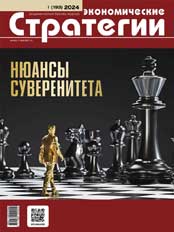Strategic Planning in the Face of Digital Transformation Challenges
DOI: 10.33917/es-1.193.2024.54-61
High dynamics of geopolitical changes, enhanced by expansion of the range of challenges facing the country, have exposed new requirements for government and economic management. The speed with which these requirements should be realized raises the issue of the need for a technological breakthrough in the field of management. And the scale of shifts in the global economy requires special attention to strategic planning, raising its role in the public administration system to a level that will ensure all government bodies’ orientation towards achieving the goals of social development that are being formed right now.
The article dwells on the issues of strategic planning technologization, the challenges to which a new strategic planning system should respond, some risks of digital transformation of the public administration sector and possible directions for overcoming them.
References:
1. Aver’yanov M.A., Evtushenko S.N., Kochetova E.Yu. Tsifrovoe obshchestvo: novye vyzovy [Strategic Planning — Necessary Condition for Developing the Vital Activity of Modern Society]. Ekonomicheskie strategii, 2017, no 6, pp. 166–175.
2. Ukaz Prezidenta Rossiyskoy Federatsii ot 8 noyabrya 2021 g. N 633 “Ob utverzhdenii Osnov gosudarstvennoy politiki v sfere strategicheskogo planirovaniya v Rossiyskoy Federatsii” [Decree of the President of the Russian Federation of November 8, 2021 No. 633 “On approval of theFundamentals of State Policy in the Sphere of Strategic Planning in the Russian Federation”]. Garant, available at: https://www.garant.ru/products/ipo/prime/doc/402915816/
3. Putin prizval rasshirit’ natsional’nye tseli razvitiya [Putin called for expanding national development goals]. RIA Novosti, 2023, 21 dekabrya, available at: https://ria.ru/20231221/putin-1917226925.html?in=l





